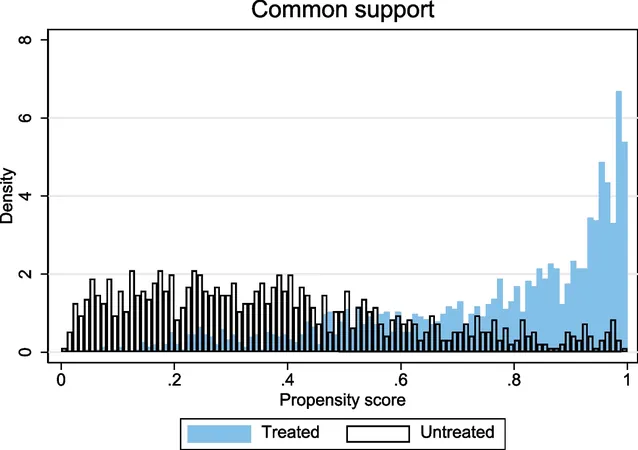
The Unseen Power of Social Media: How WeChat is Transforming Environmental Awareness in China
2024-11-21
Author: Nur
The Unseen Power of Social Media: How WeChat is Transforming Environmental Awareness in China
In recent years, the escalating environmental challenges such as climate change, air pollution, and species extinction have captured global attention. Human activities are significantly responsible for these issues, particularly in rapidly developing nations like China. Over the past few decades, China has witnessed unprecedented economic growth—averaging over 8% annually—which has unfortunately been accompanied by severe environmental degradation. As the world’s second-largest economy, China faces the daunting task of balancing economic development and environmental sustainability.
Experts argue that this degradation isn’t merely an economic issue but a moral one, necessitating a collaborative effort from both businesses and individuals. The introduction of frameworks like Social and Environmental Collective Protection (SECP) highlights the growing responsibility enterprises have towards the environment. But how can this responsibility be heightened? Enter social media—the tool that is revolutionizing communication, including dialogues around environmental issues.
One of the main players in social media today is WeChat, which boasts approximately 1.37 billion monthly active users. WeChat isn’t just a platform for messaging or sharing; it's becoming a vital instrument for driving environmental consciousness among users. Unlike traditional platforms that promote information sharing broadly, WeChat thrives on intimate interactions—most users' contacts consist of close friends and family, thereby shaping a different narrative around environmental discourse.
Despite its potential, existing research on WeChat's specific impact on environmental awareness remains sparse. Unlike platforms such as YouTube or Instagram, which have been shown to elevate climate change awareness significantly, WeChat’s role in disseminating environmental messages has not been thoroughly examined. This raises questions: How does WeChat influence the environmental awareness of its users? Does increased usage correlate directly with greater environmental consciousness?
To explore this, we delve into the findings derived from a comprehensive survey carried out in 2018 in China, assessing the relationship between WeChat usage and individual environmental awareness. Utilizing counterfactual causal inference analysis, we evaluate how often users engage with WeChat and its corresponding impact on their environmental beliefs and behaviors.
Interestingly, social media isn't just about awareness; it actively shapes consumer behavior. Evidence shows that users who frequently engage on social media platforms are more inclined to prefer and purchase green products. For younger demographics, social media significantly influences commitment to sustainable practices as their participation in environmental activities fosters meaningful changes in consumption choices.
However, it is crucial to note that increased usage of platforms like WeChat does not uniformly enhance environmental awareness for all user groups. Research indicates that individuals less familiar with the internet may experience significant gains in environmental knowledge through their interactions on such platforms—this leads to a dual narrative: the more one engages with WeChat, the more aware they become; conversely, those with limited experience may find profound insights and learning opportunities through it.
As the journey of utilizing WeChat for improving environmental awareness unfolds, the necessity of understanding its effects through a nuanced lens becomes evident. While the general inclination is to view social media as a universally beneficial tool for promoting green practices, caution is warranted. There are challengers; some users may engage more with content that promotes less sustainable behaviors.
Indeed, the discrepancies found between varying user demographics—particularly age, education, and socioeconomic status—underscore the need for targeted strategies in harnessing the persuasive power of WeChat. Such insights are vital for crafting educational campaigns that are relevant and resonate with diverse audiences.
As the narrative around climate change continues to evolve, WeChat stands as a formidable ally in raising awareness and shaping pro-environmental behaviors among its extensive user base. The journey of melding technology with environmental stewardship has only just begun—will WeChat become the turning point for environmental change in China or remain a mere footnote in the broader digital landscape? Only time will tell if this digital phenomenon can catalyze real sustainability in the face of overwhelming environmental challenges.
Stay tuned for more updates as we continue to explore the intersection of social media and environmental consciousness in the age of the digital revolution!


 Brasil (PT)
Brasil (PT)
 Canada (EN)
Canada (EN)
 Chile (ES)
Chile (ES)
 España (ES)
España (ES)
 France (FR)
France (FR)
 Hong Kong (EN)
Hong Kong (EN)
 Italia (IT)
Italia (IT)
 日本 (JA)
日本 (JA)
 Magyarország (HU)
Magyarország (HU)
 Norge (NO)
Norge (NO)
 Polska (PL)
Polska (PL)
 Schweiz (DE)
Schweiz (DE)
 Singapore (EN)
Singapore (EN)
 Sverige (SV)
Sverige (SV)
 Suomi (FI)
Suomi (FI)
 Türkiye (TR)
Türkiye (TR)